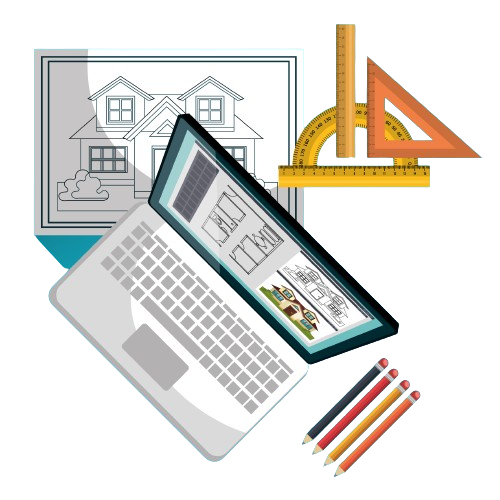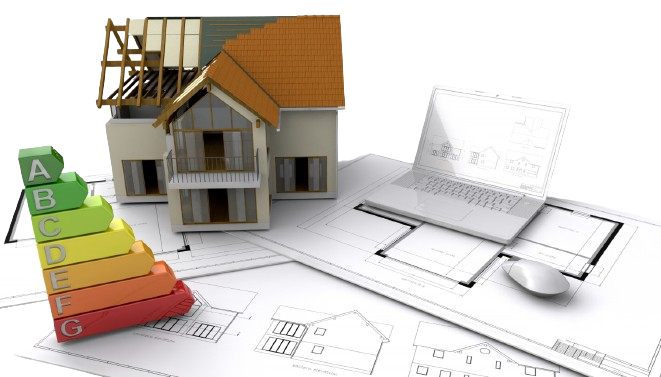
This is the ultimate guide to roofing CRM from EQUP! Whether your roofing business is already using a CRM software or thinking about trying it out, this guide is here to help you.
Starting with a CRM might seem overwhelming because there’s so much to learn, but don’t worry—we’re here to make it easy. We’ll explain the basics, show you what features to look for and share the best ways to get the most out of your roofing software.
Throughout this guide, we’ll break down everything step by step, making it simple for those who already use a CRM and those who are just starting. Our goal is to help your roofing company succeed by making the most of your CRM investment. We’ll also help you turn challenges into opportunities and set the path for your business’s success. Let’s make managing your roofing projects easier together with EQUP!
What is a roofing CRM?

A roofing CRM is a specialized software tool designed to help roofing companies manage their interactions with customers and streamline various aspects of their business. It serves as a centralized hub for organizing and tracking customer information, communication, and project details. Here are some key features and functionalities typically associated with roofing CRMs:
- Sales Pipeline
- Customer information
- Billing details
- Material orders
- Production
- Reporting
CRM for roofers is a comprehensive solution tailored to the specific needs of roofing companies, aiming to contribute to the overall efficiency and success of the business.
CRMs For Roofing Vs. Standard CRMs

When it comes to CRMs, there’s a difference between the standard ones and those tailored for roofing businesses. Regular CRMs are like all-purpose tools – they help manage customer info, track activities, check project statuses, and run basic reports. They’re okay for any business, but roofing CRMs are like specialized tools designed just for roofing companies.
Roofing CRMs do many of the same things as regular ones, but they’re built with a roofing business in mind. This means the way you use them, the features they have, and how they work all fit perfectly into the workflow of a typical roofing company. It’s like having a tool that’s made specifically for the job you do, making everything more streamlined and efficient.
The best roofing CRM helps businesses handle everything from the first customer inquiry to getting paid. This includes:
- Keeping track of potential customers and opportunities.
- Making cost estimates and creating contracts.
- Organizing documents and pictures.
- Automating and keeping tabs on communication.
- Ordering materials and measuring roofs from above.
- Overseeing the production process.
- Planning work schedules and deliveries.
- Receiving payments.
- Generating reports on how well sales are going.
Who Uses Roofing CRM?

Roofing CRM software is like a helpful tool that’s not just for bosses but for everyone in the company. It makes things better for different teams, like the ones talking to customers, the ones doing the actual roofing work, and the folks in the office. This way, everyone can easily work together from the beginning to the end of roofing projects. It’s like teamwork made easier by using the software, no matter what job each person does in the company.
The Best Roofing CRM Features and Functionality
Roofing CRM software is a game-changer for roofing contractors, offering a suite of features and functionalities that streamline operations and enhance overall efficiency. Here’s a detailed look at some of the key aspects that make roofing CRMs indispensable:
- Lead Management
Effectively managing leads is a crucial aspect that can make a significant impact on the success of a business. Roofing contractors, whether they are handling residential or commercial projects, can greatly benefit from utilizing roofing CRM software for streamlined lead management. Here’s a closer look at how CRM enhances lead management in the roofing business:
- Centralized Lead Information: CRM software serves as a centralized hub for all lead-related information. From initial contact details to communication history, documents, and project specifications, everything is organized and easily accessible. This eliminates the risk of crucial lead information slipping through the cracks.
- Sales Pipeline Visibility: One of the key advantages of using CRM for lead management is the clear visibility it provides into the sales pipeline. Contractors can track the progress of each lead, gaining insights into where they stand in the sales process. This visibility empowers the sales team to prioritize efforts effectively and focus on opportunities with a higher likelihood of conversion.
- Activity Tracking: Every interaction with a lead is meticulously tracked within the CRM. From emails and phone calls to meetings and follow-ups, the CRM ensures that all activities related to a lead are documented. This not only helps in understanding the lead’s engagement but also enables the team to plan the next steps strategically.
- Optimized Selling Efforts: With a detailed view of each lead’s status and history, the sales team can tailor their selling efforts. This ensures that they focus on the right opportunities at the right time, increasing the chances of successful conversions. CRM software empowers the team to make informed decisions and avoid wasting time on leads that may not be ready for engagement.
- Automated Follow-ups: Roofing CRM systems often come equipped with automation features that enable scheduled follow-ups. Automated reminders ensure that no follow-up appointments or communications are missed, enhancing the efficiency of the sales process. This proactive approach helps in nurturing leads and maintaining consistent communication.
- Lead Segmentation: CRM allows for the segmentation of leads based on various criteria such as location, project size, or stage in the sales funnel. This segmentation facilitates targeted marketing and personalized communication strategies. Contractors can tailor their approach to different segments, increasing the relevance of their interactions with leads.
- Data-driven Decision Making: The data collected and analyzed within the CRM provides valuable insights for data-driven decision-making. Contractors can identify patterns, assess the effectiveness of marketing strategies, and refine their approach based on real-time information. This continuous improvement cycle contributes to a more strategic and successful lead management process.
Implementing roofing CRM for lead management in the roofing business goes beyond just organizing information.
- Roofing Crew Scheduling
Efficient scheduling is a cornerstone of successful roofing projects, and roofing CRM software proves to be an invaluable asset in this regard. A roofing CRM allows seamless roofing crew scheduling by offering different functionalities, such as:
- Real-time Crew Availability: Roofing CRM software provides contractors with the ability to instantly check the availability of roofing crews. This real-time visibility allows for quick and informed decision-making when assigning tasks and scheduling labor.
- Streamlined Task Assignment: The CRM system simplifies the process of task assignment by offering an intuitive platform for scheduling labor. Contractors can easily allocate specific tasks to individual crew members based on their availability, skills, and project requirements.
- Key Project Details Sharing: Communication is key in roofing projects, and roofing CRM software facilitates seamless sharing of key project details among team members. From project timelines to specific requirements, the CRM ensures that everyone is on the same page, reducing the chances of misunderstandings.
- Automated Notifications: In roofing projects, changes and updates are inevitable. Roofing CRMs enable contractors to automatically notify crews of any important changes, such as project delays or updates. This ensures that all team members are promptly informed, promoting proactive adjustments to the project schedule.
- Efficient Adaptation to Changes: Unexpected circumstances can impact project timelines. Roofing CRM software equips contractors with the tools to swiftly adapt to changes. Whether it’s reassigning tasks or rescheduling labor, the CRM streamlines the process, minimizing disruptions and maintaining project momentum.
- Enhanced Collaboration: Collaboration is strengthened as roofing CRM allows for transparent and centralized communication. Crew members can access the CRM to stay updated on project schedules, task assignments, and any changes. This fosters a collaborative environment, improving overall team coordination.
- Optimized Resource Utilization: Roofing CRM software assists in optimizing resource utilization by ensuring that the right personnel are assigned to the right tasks. This not only enhances efficiency but also contributes to the overall productivity of the roofing crew.
- Improved Project Timelines: With roofing CRM streamlining crew scheduling, projects are more likely to adhere to timelines. The software minimizes scheduling conflicts, ensures proper resource allocation, and helps in meeting deadlines with greater precision.
Roofing crew scheduling using roofing CRM software is a transformative solution for contractors aiming to enhance project coordination and efficiency. By leveraging real-time information, automated notifications, and collaborative tools, roofing CRM software becomes an indispensable ally in the successful execution of roofing projects.
3. Roof Estimates

Accurate and timely estimates are crucial for winning projects and satisfying customers. Roofing CRM software emerges as a powerful tool, revolutionizing the way roof estimates are created and managed. Below are key features and benefits that make roof estimates a seamless process with the integration of roofing CRM:
- Effortless Estimation: Roofing CRM software empowers sales teams to generate estimates effortlessly. With just a few clicks, salespeople can create comprehensive estimates, saving valuable time and reducing the risk of errors associated with manual calculations.
- Template Efficiency: The best CRMs for roofing allow teams to utilize templates that automatically pull essential information. Customer details, measurements, and material pricing are seamlessly integrated, ensuring consistency and accuracy across all estimates.
- Real-time Information Access: Integrating material supplier ordering within the CRM provides real-time access to product catalogs. This ensures that estimates are built using the latest pricing and availability information, eliminating delays caused by outdated data.
- Streamlined Collaboration: Roofing CRM fosters collaboration between sales teams and other departments involved in the estimation process. Whether it’s obtaining input from production teams or coordinating with material suppliers, the CRM serves as a centralized platform for streamlined communication.
- Precision in Pricing: By automating the inclusion of material costs and other pricing variables, roofing CRM software enhances the precision of estimates. This not only satisfies customers with accurate quotes but also contributes to the profitability of roofing projects.
- Customization Capabilities: Roofing CRMs often come with customization features, allowing contractors to tailor estimates to specific project requirements. This flexibility ensures that estimates align with the unique needs and preferences of each customer.
- Real-time Collaboration with Clients: CRM software often includes customer portals, offering homeowners a central hub for project details and estimates. This real-time collaboration enhances transparency, as clients can review and discuss estimates, providing valuable feedback for finalizing project scopes.
Roofing CRM software transforms the estimation process from a cumbersome task to a strategic advantage for roofing contractors. The integration of technology not only simplifies the creation of estimates but also contributes to improved accuracy, collaboration, and overall project success.
4. Roofing Material Orders
Efficiently managing roofing material orders is a critical aspect of streamlined operations for roofing contractors, and the use of Roofing CRM brings a new level of simplicity and effectiveness to this process.
- Real-Time Catalog Access: Roofing CRMs integrate real-time access to extensive product catalogs, allowing contractors to explore and select materials efficiently. This feature ensures that the latest and most accurate information is readily available, aiding in the creation of precise estimates and material orders.
- Estimate Generation: Sales teams can create estimates effortlessly within a few clicks using templates provided by the CRM. These templates automatically pull essential customer information, measurements, and material pricing, guaranteeing accuracy in the estimation process.
- Direct Order Placement: One of the standout features of roofing CRMs is the ability to place material orders directly through the system. This eliminates the need for contractors to make time-consuming phone calls to distributors, streamlining the entire ordering process.
- Order Tracking: The CRM keeps contractors informed about the status of material orders in real time. From order placement to delivery, contractors can easily track the progress of each order, ensuring timely and efficient handling of materials for roofing projects.
- Integration with Material Suppliers: Integration capabilities with material suppliers further enhance the convenience of the roofing CRM. Contractors can establish seamless connections with suppliers, facilitating smooth information exchange and reducing the risk of errors associated with manual data entry.
- Centralized Information Hub: All material-related information, including estimates, orders, and delivery statuses, is centralized within the CRM. This centralized hub ensures that everyone involved in the project has access to the latest information, fostering collaboration and minimizing the chances of miscommunication.
- Time and Cost Savings: The streamlined process of ordering roofing materials through the CRM translates into significant time savings for roofing contractors. By eliminating unnecessary steps and providing real-time information, the CRM contributes to operational efficiency and, ultimately, cost savings.
- Enhanced Decision-Making: With comprehensive data on material orders readily available, contractors can make informed decisions regarding inventory management, project timelines, and resource allocation. The CRM’s reporting capabilities offer insights that empower contractors to optimize their material procurement strategies.
Roofing CRM software revolutionizes the way contractors handle material orders. The CRM system serves as a valuable tool in ensuring a smooth and efficient supply chain for roofing projects.
5. Roofing Project Management

The integration of Roofing CRM has revolutionized how roofing projects are planned, executed, and monitored. Below are some ways in which Roofing CRM enhances project management for roofing contractors:
- Estimating and Planning: Roofing CRMs empower contractors to create accurate estimates effortlessly. By utilizing templates that automatically pull in customer information, measurements, and material pricing, contractors can ensure precision in their project cost estimates. Planning becomes a breeze as the CRM provides a comprehensive view of the project scope, allowing contractors to allocate resources efficiently.
- Permit Management: Roofing CRM streamlines the often complex process of permit management. Contractors can easily track the status of permits within the system, ensuring that all necessary approvals are obtained before commencing the project. This integrated approach eliminates the risk of overlooking crucial permit requirements.
- Material Orders and Inventory Tracking: Integrated material supplier ordering within Roofing CRM eliminates the need for manual order placements. Contractors can access real-time product catalogs, place orders directly within the CRM, and track the delivery status of materials. Inventory tracking features ensure that contractors have visibility into the availability of materials, preventing unnecessary delays.
- Progress Monitoring: Roofing CRMs provide a centralized hub for monitoring project progress. From the initial estimating phase to scheduling, ordering materials, and coordinating crews, the CRM keeps all stakeholders informed at every milestone. Project managers can easily track the status of various tasks and identify potential bottlenecks, allowing for proactive intervention.
- Communication Hub: Communication tracking within the CRM simplifies collaboration among different teams handling various aspects of the project. Emails and texts can be sent and tracked centrally, ensuring a transparent communication flow. Teams can communicate within the CRM, streamlining discussions and keeping everyone involved in the loop.
- Customer Interaction and Feedback: Roofing CRMs often include features that facilitate customer interaction. Homeowners can access project details, documents, and even exchange messages through a customer portal. Gathering feedback and addressing concerns becomes more efficient, contributing to overall customer satisfaction.
The future of roofing project management is here, and it’s powered by the capabilities of Roofing CRM.
6. Communication Tracking
Effective communication is the backbone of successful roofing projects, and roofing CRM software plays a pivotal role in ensuring seamless and organized interactions. Here’s a closer look at how communication tracking using roofing CRM enhances collaboration and streamlines the flow of information:
- Centralized Communication Hub: Roofing CRM serves as a centralized hub for all communication related to a project. Emails, texts, and messages are stored in one location, eliminating the need to sift through multiple platforms or channels.
- Efficient Documentation: Every interaction is documented within the CRM system, providing a comprehensive record of conversations. This documentation proves invaluable in reviewing past discussions, tracking decisions, and ensuring that everyone involved in the project is on the same page.
- Real-time Updates: The CRM system facilitates real-time updates on communication. Team members can instantly send and receive messages, ensuring timely responses and reducing delays in decision-making processes.
- Collaborative Environment: Communication tracking in roofing CRM fosters a collaborative environment. Team members can easily access and review ongoing conversations, contributing to a collective understanding of project updates, challenges, and resolutions.
- Task and Notification Integration: The CRM system integrates communication tracking with task management and notifications. This ensures that relevant team members are notified when new messages or updates occur, promoting swift action and preventing critical information from being overlooked.
- Cross-Departmental Coordination: In roofing projects, different departments handle various aspects of the process. Communication tracking within the CRM bridges the gap between departments by allowing users to view and contribute to conversations. This ensures that everyone involved, from sales and production teams to office staff, stays informed and aligned.
- Customer Interaction Monitoring: For roofing contractors, client communication is paramount. The CRM system enables contractors to monitor and track interactions with customers, providing insights into client preferences, concerns, and feedback. This information can be instrumental in delivering a personalized and satisfactory customer experience.
- Ease of Reporting: The CRM system simplifies reporting by consolidating communication data. Users can generate reports on communication trends, response times, and customer engagement, offering valuable insights for optimizing communication strategies.
- Enhanced Transparency: Transparency is crucial in roofing projects, and CRM-driven communication tracking enhances transparency across the entire organization. Stakeholders can access a transparent overview of project communication, promoting accountability and informed decision-making.
Communication tracking using roofing CRM software not only organizes and streamlines communication but also contributes to a collaborative and transparent project environment. This tool ensures that vital information is easily accessible, facilitating efficient teamwork.
7. Permits, Supplements, and Mortgage Check Tracking
Roofing CRM software comes to the rescue by providing robust tools for tracking and managing these crucial aspects of the construction process.
- Permits Tracking: Roofing contractors often deal with permits to ensure compliance with local regulations. Roofing CRM software allows contractors to digitally track the status of permit applications. This means you can easily monitor when permits are submitted, track their approval progress, and know precisely when they are received. This level of transparency helps avoid delays, enabling contractors to plan and execute projects seamlessly.
- Supplements Management: Supplements are additional costs or modifications that may arise during a roofing project. Roofing CRM systems provide a dedicated space to track and manage supplements efficiently. Contractors can document and update supplement information, ensuring that any adjustments to the project scope are accurately recorded. This feature aids in maintaining financial transparency and avoiding disputes by having a clear record of any changes made throughout the project.
- Mortgage Check Tracking: Mortgage checks are an integral part of the payment process in roofing projects. Roofing CRM software simplifies this by offering a systematic approach to track mortgage checks. Contractors can easily monitor the status of mortgage payments, ensuring that payments are received promptly and facilitating better financial management. This feature contributes to a smoother cash flow and enhances overall project financial control.
By centralizing permits, supplements, and mortgage check tracking, contractors can navigate the complexities of construction projects with greater ease, ensuring compliance, financial transparency, and timely project completion.
Benefits of Roofing CRM
Roofing contractors can gain a competitive edge and streamline their operations by using roofing CRM. The numerous benefits of incorporating CRMs into roofing businesses include:
- Improved Accuracy, Less Human Error
- Humans are prone to errors, and in the roofing business, even a small mistake can lead to significant issues. Roofing software minimizes errors by providing a centralized platform for accessing critical information such as photos, material orders, aerial measurements, and billing details.
- With a single source of truth, the likelihood of missing or inaccurately inputting vital information is significantly reduced, ensuring accuracy throughout the entire project.
- More Staff Accountability
- Accountability is crucial for the success of roofing projects, involving coordination between business owners, office staff, and field teams. When a roofing CRM is implemented, it becomes easier to track progress and hold staff accountable.
- The CRM allows everyone involved in the project to have visibility into the current status and the next steps, facilitating proactive measures to address potential issues and ensure smooth project flow.
- Easier Performance Tracking
- The best CRMs for roofers offer comprehensive insights into vital business information, enabling contractors to make more informed decisions about their operations. These CRMs provide pre-built and customizable reports and dashboards, offering a clear picture of performance metrics.
- Contractors can visualize data related to projects, leads, and other key aspects, leading to more informed decision-making and strategic planning for the growth and success of the business.
- Hours Saved Each Day
- Roofing CRMs contribute to significant time savings by centralizing information, automating tasks and communications, and reducing redundant data entry. The elimination of unnecessary administrative work allows team members to focus on high-priority tasks, boosting overall productivity.
- The CRM acts as a hub for various functionalities, cutting out the need for multiple third-party applications, resulting in a more streamlined and efficient workflow.
The adoption of CRM software in the roofing industry goes beyond mere technological integration—it transforms how businesses operate, ensuring accuracy, accountability, enhanced decision-making, and substantial time savings.
Transform Your Roofing Businesses with Efficiency and Power Using EQUP
EQUP roofing CRM stands out as a specialized solution tailored specifically for roofing contractors, ensuring ease of use and optimal functionality. Designed to streamline and organize every facet of a roofing company, EQUP empowers contractors to concentrate on business growth.
Beyond its user-friendly interface, EQUP is enriched with a robust set of features that not only simplify tasks but also elevate productivity and profitability. Here are some of the key capabilities that make EQUP an indispensable tool for roofing contractors:
- Comprehensive Lead and Task Tracking: EQUP provides a centralized system for tracking leads and managing tasks, ensuring that contractors stay organized and focused on potential business opportunities.
- Efficient Management of Visual Assets: The software allows contractors to seamlessly organize and manage photos, videos, and documents related to roofing projects, facilitating easy access and reference.
- Streamlined Estimation and Contract Creation: EQUP simplifies the estimation and contract creation process, enabling contractors to generate accurate and professional estimates for clients effortlessly.
- Integrated Text Communication: The software facilitates seamless text communication, allowing contractors to send and receive messages within the platform, ensuring effective and timely communication.
- Payment Collection: EQUP includes features for collecting payments, streamlining the financial aspect of roofing projects and ensuring timely transactions.
- Labor Scheduling: Contractors can efficiently schedule labor, ensuring that teams are organized and deployed effectively for various roofing projects.
- Project Management: EQUP offers robust project management tools, allowing contractors to oversee and manage the progress of roofing projects from start to finish.
- Detailed Reporting: The software provides comprehensive reporting capabilities, giving contractors valuable insights into various aspects of their business, allowing for informed decision-making.
- Automation of Email, Texts, and Tasks: EQUP automates repetitive tasks, such as sending emails and texts, enhancing efficiency and reducing manual workload for the roofing team.
- Homeowner Financing Options: Contractors can leverage EQUP to offer homeowner financing, providing flexible payment solutions to clients and expanding business opportunities.
- And More: EQUP encompasses a range of additional features designed to cater to the unique needs of roofing contractors, ensuring a holistic solution for business management.
EQUP goes beyond being a mere CRM; it’s a comprehensive business management CRM for roofing contractors, facilitating seamless operations, efficient communication, and excellent business growth. With EQUP, roofing professionals can confidently navigate the complexities of their industry, delivering outstanding results on every project